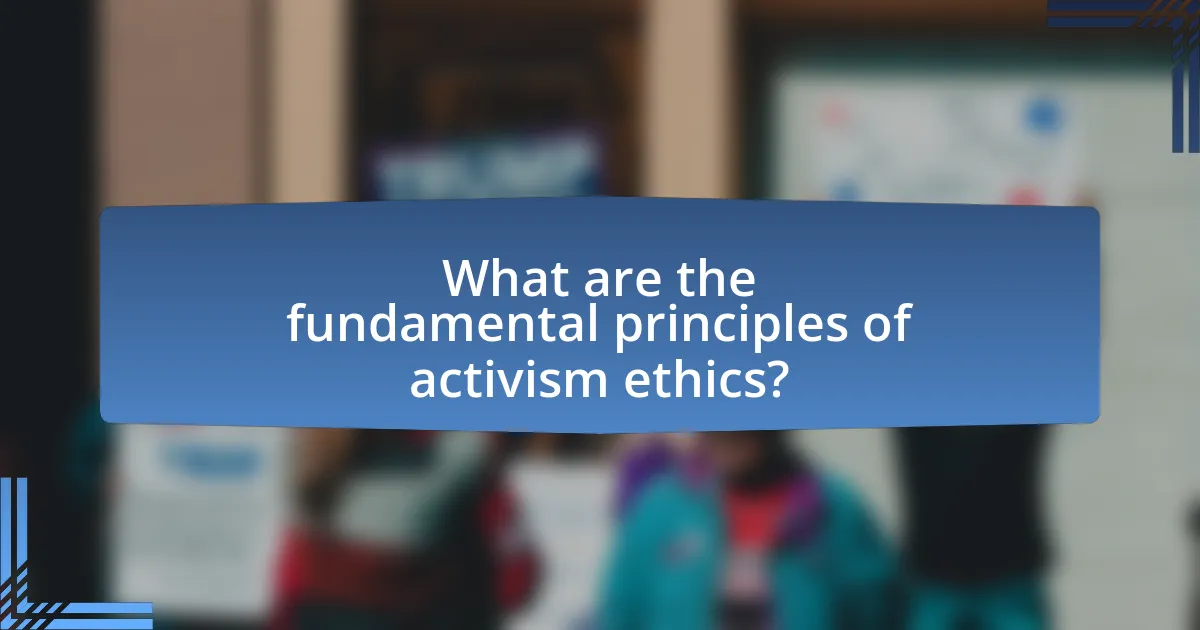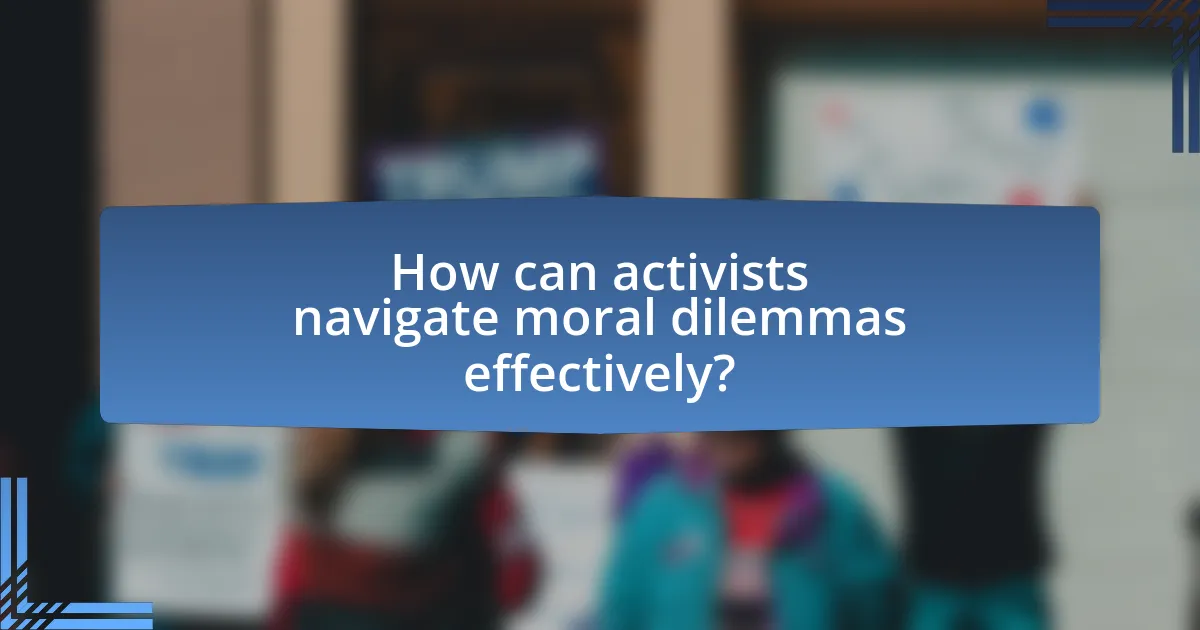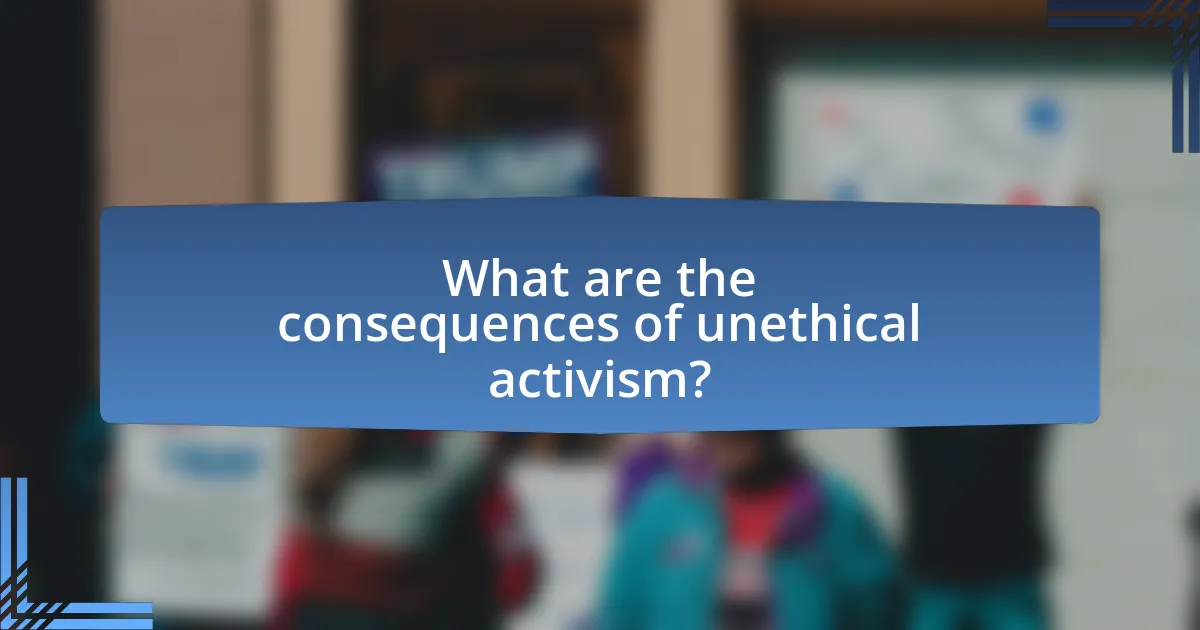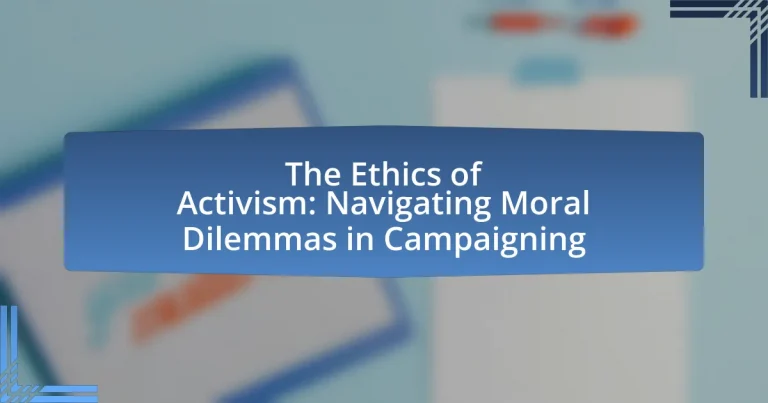The article focuses on the ethics of activism, emphasizing the fundamental principles that guide ethical decision-making in campaigning, including justice, accountability, transparency, and respect for individuals. It explores how ethical theories such as utilitarianism, deontology, and virtue ethics inform activist strategies and help navigate moral dilemmas. The discussion includes the importance of transparency in building public trust, the risks associated with unethical practices, and the role of community feedback in ethical decision-making. Additionally, the article highlights historical examples of activism, best practices for maintaining ethical standards, and resources available for activists seeking ethical guidance.

What are the fundamental principles of activism ethics?
The fundamental principles of activism ethics include justice, accountability, transparency, and respect for individuals. Justice emphasizes fairness and the pursuit of social change that benefits marginalized communities. Accountability requires activists to take responsibility for their actions and the consequences they may have on others. Transparency involves open communication about goals, methods, and funding sources to build trust within the community. Respect for individuals highlights the importance of valuing the dignity and rights of all people affected by activism efforts. These principles guide ethical decision-making and help navigate moral dilemmas in campaigning.
How do ethical theories apply to activism?
Ethical theories apply to activism by providing frameworks that guide activists in making moral decisions about their actions and strategies. For instance, utilitarianism encourages activists to consider the greatest good for the greatest number, influencing decisions on which campaigns to prioritize based on potential outcomes. Deontological ethics emphasizes the importance of duty and principles, leading activists to adhere to moral rules regardless of the consequences, such as advocating for human rights even when facing backlash. Virtue ethics focuses on the character and intentions of the activist, promoting actions that reflect moral virtues like justice and compassion. These theories help activists navigate complex moral dilemmas, ensuring their efforts align with ethical standards and societal values.
What role do consequentialism and deontology play in activist strategies?
Consequentialism and deontology significantly influence activist strategies by shaping the ethical frameworks that guide decision-making and actions. Consequentialism focuses on the outcomes of actions, prompting activists to prioritize strategies that maximize positive results, such as social change or environmental protection. For instance, an activist may support a controversial protest if it is believed to lead to substantial societal benefits, reflecting a consequentialist approach.
In contrast, deontology emphasizes adherence to moral rules and duties, leading activists to consider the ethical implications of their methods regardless of the outcomes. This perspective may result in a refusal to engage in tactics perceived as unethical, such as violence or deception, even if such actions could yield favorable results. An example of this is the commitment of many human rights activists to nonviolent resistance, grounded in deontological principles.
Both ethical frameworks are essential in activist strategies, as they provide a basis for evaluating the morality of actions and the justification for chosen methods, ultimately influencing the effectiveness and public perception of activism.
How can virtue ethics inform the behavior of activists?
Virtue ethics can inform the behavior of activists by emphasizing the development of moral character and virtues such as courage, compassion, and integrity. Activists guided by virtue ethics focus on embodying these qualities in their actions, which fosters trust and credibility within their communities. For instance, historical figures like Martin Luther King Jr. exemplified courage and integrity, which inspired collective action and social change. By prioritizing virtues, activists can navigate moral dilemmas more effectively, ensuring their strategies align with ethical principles and contribute positively to societal transformation.
What moral dilemmas do activists commonly face?
Activists commonly face moral dilemmas such as balancing the urgency of their cause with ethical methods of advocacy. For instance, they may struggle with the decision to use civil disobedience, which can break laws but aims to highlight injustices, versus adhering to legal frameworks that may limit their effectiveness. Additionally, activists often grapple with the implications of their actions on marginalized communities, ensuring that their efforts do not inadvertently harm those they intend to help. Research indicates that these dilemmas can lead to significant internal conflict, as activists weigh the potential benefits of their actions against the ethical considerations involved in their methods.
How do activists balance personal beliefs with collective goals?
Activists balance personal beliefs with collective goals by prioritizing shared values and fostering open dialogue within their groups. This approach allows them to align individual convictions with the broader mission of the movement, ensuring that personal perspectives contribute to collective strategies. For instance, during the civil rights movement, leaders like Martin Luther King Jr. emphasized unity and collaboration, which helped harmonize diverse beliefs towards a common objective of racial equality. This historical context illustrates how effective communication and compromise can facilitate a balance between individual and collective aspirations in activism.
What are the ethical implications of using controversial tactics?
The ethical implications of using controversial tactics in activism include potential harm to individuals or communities, the risk of undermining trust in the movement, and the possibility of alienating supporters. Controversial tactics, such as civil disobedience or aggressive protests, can lead to negative public perception and backlash, which may detract from the intended message. For instance, a study by the American Psychological Association found that while some controversial tactics can draw attention to issues, they may also provoke hostility and reduce public support for the cause. Thus, the ethical considerations revolve around balancing the urgency of the message with the potential consequences of the methods employed.
Why is transparency important in activism?
Transparency is important in activism because it fosters trust and accountability among activists, supporters, and the public. When organizations and individuals are transparent about their goals, methods, and funding sources, they enhance their credibility and encourage greater participation. Research indicates that transparency can lead to increased donor confidence and support, as seen in a study by the Stanford Social Innovation Review, which found that organizations demonstrating clear communication about their operations are more likely to receive funding and volunteer support. This trust is crucial for mobilizing communities and sustaining long-term engagement in social causes.
How does transparency affect public trust in activist movements?
Transparency significantly enhances public trust in activist movements. When organizations openly share their goals, funding sources, and decision-making processes, they foster credibility and accountability. Research indicates that movements with high transparency levels are perceived as more trustworthy; for instance, a study published in the Journal of Business Ethics found that transparency positively correlates with stakeholder trust and engagement. This trust is crucial for mobilizing support and sustaining long-term commitment from the public, as individuals are more likely to align with movements they believe are honest and ethical in their operations.
What are the risks of lacking transparency in campaigns?
Lacking transparency in campaigns poses significant risks, including loss of public trust, potential misinformation, and decreased engagement. When campaigns do not openly share their goals, funding sources, or decision-making processes, they can create skepticism among stakeholders. Research indicates that 81% of consumers need to trust a brand to buy from them, highlighting the importance of transparency in maintaining credibility. Furthermore, a lack of clarity can lead to the spread of misinformation, as audiences may fill in gaps with assumptions or false narratives. This can ultimately result in decreased public engagement, as individuals may feel disillusioned or manipulated, leading to lower participation rates in future initiatives.

How can activists navigate moral dilemmas effectively?
Activists can navigate moral dilemmas effectively by employing a structured decision-making framework that includes ethical reasoning, stakeholder analysis, and reflection on personal values. This approach allows activists to evaluate the implications of their actions on various stakeholders, ensuring that their choices align with their ethical principles and the broader goals of their activism. For instance, the use of ethical theories such as utilitarianism, which focuses on the greatest good for the greatest number, can guide activists in assessing the potential outcomes of their decisions. Additionally, engaging in dialogue with affected communities can provide insights into the moral complexities involved, fostering a more inclusive and informed decision-making process. This method is supported by research indicating that ethical deliberation enhances the effectiveness of activism by promoting accountability and transparency in actions.
What frameworks can guide ethical decision-making in activism?
Ethical decision-making in activism can be guided by several frameworks, including utilitarianism, deontological ethics, and virtue ethics. Utilitarianism focuses on the outcomes of actions, advocating for choices that maximize overall happiness and minimize harm, as seen in campaigns that prioritize the greatest good for the largest number of people. Deontological ethics emphasizes adherence to rules and duties, suggesting that activists should act according to moral principles regardless of the consequences, which is evident in movements that uphold human rights regardless of public opinion. Virtue ethics centers on the character and intentions of the activist, promoting actions that reflect moral virtues such as honesty and integrity, which can be observed in grassroots organizations that prioritize transparency and community engagement. These frameworks provide structured approaches to navigate the complex moral dilemmas faced in activism.
How can activists assess the potential impact of their actions?
Activists can assess the potential impact of their actions by utilizing strategic planning and evaluation frameworks. These frameworks often include setting clear objectives, identifying target audiences, and measuring outcomes through both qualitative and quantitative methods. For instance, the SMART criteria (Specific, Measurable, Achievable, Relevant, Time-bound) can guide activists in defining their goals and assessing progress. Additionally, analyzing case studies of previous campaigns can provide insights into effective strategies and potential pitfalls. Research indicates that campaigns employing data-driven approaches, such as surveys and social media analytics, can better gauge public response and influence, thereby enhancing their overall effectiveness.
What role does community feedback play in ethical decision-making?
Community feedback is crucial in ethical decision-making as it provides diverse perspectives that inform and enhance the decision-making process. Engaging with community feedback allows decision-makers to understand the values, concerns, and needs of the community, ensuring that ethical considerations align with societal expectations. For instance, studies have shown that organizations that actively seek and incorporate community input are more likely to make decisions that are perceived as fair and just, thereby fostering trust and accountability. This participatory approach not only strengthens the legitimacy of the decisions made but also promotes a sense of ownership among community members, which is essential for ethical activism.
How can activists ensure their methods align with their values?
Activists can ensure their methods align with their values by conducting a thorough assessment of their strategies against their core principles. This involves defining their values clearly, such as justice, equality, or non-violence, and then evaluating each method for consistency with these values. For instance, if an activist values non-violence, they should avoid tactics that involve aggression or harm. Research indicates that alignment between methods and values enhances credibility and effectiveness, as seen in movements like the Civil Rights Movement, where non-violent protests were central to their ethical stance. This alignment not only fosters trust among supporters but also strengthens the overall impact of the activism.
What strategies can be employed to maintain ethical integrity?
To maintain ethical integrity, individuals and organizations can implement strategies such as establishing clear ethical guidelines, promoting transparency, and fostering a culture of accountability. Clear ethical guidelines provide a framework for decision-making, ensuring that actions align with moral principles. Transparency in communication and operations builds trust among stakeholders, as it allows for open scrutiny of actions and intentions. Fostering a culture of accountability encourages individuals to take responsibility for their actions, reinforcing the importance of ethical behavior. Research indicates that organizations with strong ethical cultures are more likely to achieve long-term success and maintain stakeholder trust, as evidenced by studies from the Ethics & Compliance Initiative, which highlight the correlation between ethical practices and organizational performance.
How can activists adapt their approaches based on ethical evaluations?
Activists can adapt their approaches based on ethical evaluations by critically assessing the moral implications of their strategies and aligning them with ethical principles. This involves evaluating the potential consequences of their actions, ensuring that their methods do not harm individuals or communities, and considering the broader societal impact. For instance, research by the Stanford Social Innovation Review highlights that ethical activism fosters trust and credibility, which can enhance the effectiveness of campaigns. By prioritizing ethical considerations, activists can create more sustainable and impactful movements that resonate with a wider audience.

What are the consequences of unethical activism?
Unethical activism can lead to significant negative consequences, including loss of credibility, public backlash, and legal repercussions. When activists engage in dishonest practices, such as spreading misinformation or resorting to violence, they undermine their cause and alienate potential supporters. For instance, a study by the Pew Research Center found that 70% of Americans believe that misleading information can harm social movements, indicating that credibility is crucial for effective activism. Additionally, unethical tactics can provoke legal actions against activists, as seen in cases where protests escalate into violence, resulting in arrests and lawsuits. These consequences not only damage the reputation of the activists involved but can also hinder the broader movement’s goals.
How can unethical practices harm activist movements?
Unethical practices can significantly harm activist movements by undermining their credibility and alienating potential supporters. When activists engage in dishonest tactics, such as spreading misinformation or manipulating data, they risk losing public trust, which is essential for mobilizing support and achieving their goals. For instance, the 2016 U.S. presidential election saw various activist groups face backlash for disseminating false information, leading to decreased public engagement and skepticism towards legitimate causes. This erosion of trust can result in diminished funding, reduced volunteer participation, and a fragmented movement, ultimately hindering the effectiveness of advocacy efforts.
What are the long-term effects of unethical behavior on public perception?
Unethical behavior significantly damages public perception over the long term by eroding trust and credibility. When organizations or individuals engage in unethical practices, they often face backlash that can lead to a sustained negative image. Research indicates that 86% of consumers are likely to stop doing business with a company after a scandal, highlighting the lasting impact on reputation. Furthermore, studies show that once trust is lost, it can take years to rebuild, as seen in cases like Enron and Volkswagen, where public sentiment remained negative long after the incidents. This decline in public perception can result in decreased customer loyalty, reduced sales, and a tarnished brand image, ultimately affecting long-term viability and success.
How can activists recover from ethical missteps?
Activists can recover from ethical missteps by acknowledging their errors, taking responsibility, and implementing corrective actions. Acknowledgment involves openly admitting the mistake to the affected parties and the public, which fosters transparency and trust. Taking responsibility means accepting the consequences of the misstep, which can include public apologies or resignations if necessary. Implementing corrective actions involves changing practices or policies to prevent future occurrences, such as establishing ethical guidelines or engaging in training sessions on ethical activism. Research indicates that organizations that demonstrate accountability and commitment to ethical standards can rebuild their reputations and regain public trust, as seen in cases like the environmental organization Greenpeace, which has successfully navigated ethical challenges by adopting more transparent practices.
What lessons can be learned from historical examples of activism?
Historical examples of activism demonstrate the importance of strategic organization and coalition-building. For instance, the Civil Rights Movement in the United States effectively mobilized diverse groups, leading to significant legislative changes such as the Civil Rights Act of 1964. This illustrates that uniting various stakeholders can amplify voices and create a stronger impact. Additionally, the anti-apartheid movement in South Africa highlights the necessity of sustained pressure and international solidarity, culminating in the end of apartheid in the early 1990s. These examples underscore that successful activism often requires persistence, adaptability, and the ability to engage with broader societal issues to achieve ethical and moral objectives.
How did ethical dilemmas shape the outcomes of past movements?
Ethical dilemmas significantly influenced the outcomes of past movements by forcing activists to confront moral choices that affected their strategies and public perception. For instance, during the Civil Rights Movement, leaders like Martin Luther King Jr. faced the ethical dilemma of advocating for nonviolent protest versus the potential for violent backlash. This choice shaped the movement’s identity and garnered widespread support, as nonviolence was seen as a moral high ground, contrasting with the violent responses from segregationists. Similarly, the anti-apartheid movement in South Africa grappled with the ethics of armed resistance versus peaceful negotiation, impacting international support and the eventual dismantling of apartheid. These dilemmas often determined the effectiveness of campaigns, influencing public opinion and legislative outcomes, as seen in the passage of the Civil Rights Act of 1964, which was partly a response to the moral imperatives highlighted by activists.
What can contemporary activists learn from these historical cases?
Contemporary activists can learn the importance of strategic planning and coalition-building from historical cases of activism. For instance, the Civil Rights Movement in the United States effectively utilized organized campaigns and alliances among diverse groups to achieve significant legislative changes, such as the Civil Rights Act of 1964. This demonstrates that successful activism often relies on a well-coordinated approach that brings together various stakeholders to amplify their collective voice and impact. Additionally, historical cases highlight the necessity of adapting tactics in response to changing political landscapes, as seen in the anti-apartheid movement in South Africa, where activists shifted from peaceful protests to more direct actions when faced with governmental repression. These lessons underscore the need for contemporary activists to remain flexible and responsive while fostering unity among different factions to navigate moral dilemmas effectively in their campaigns.
What best practices can activists adopt to uphold ethical standards?
Activists can uphold ethical standards by ensuring transparency in their actions and decision-making processes. Transparency fosters trust and accountability, which are essential for ethical activism. For instance, organizations like Amnesty International emphasize the importance of clear communication regarding funding sources and campaign strategies, which helps maintain credibility and public support. Additionally, activists should prioritize inclusivity by actively engaging diverse voices and perspectives, as seen in successful movements like Black Lives Matter, which incorporates a wide range of community experiences to inform its strategies. Lastly, adhering to non-violence principles, as advocated by figures like Martin Luther King Jr., reinforces ethical conduct by promoting respect for all individuals, regardless of differing viewpoints.
How can activists create a culture of accountability within their organizations?
Activists can create a culture of accountability within their organizations by establishing clear expectations and transparent processes for decision-making and behavior. This involves implementing regular evaluations of individual and group performance, fostering open communication channels for feedback, and encouraging collective responsibility among members. Research indicates that organizations with defined accountability structures, such as regular check-ins and performance reviews, experience higher levels of trust and engagement among members, which enhances overall effectiveness. For instance, a study by the Harvard Business Review found that teams with clear accountability frameworks are 30% more likely to achieve their goals compared to those without such structures.
What resources are available for activists seeking ethical guidance?
Activists seeking ethical guidance can access a variety of resources, including ethical frameworks, guidelines from established organizations, and literature on moral philosophy. Notable resources include the “Activist’s Toolkit” by the Center for Ethical Leadership, which provides practical strategies for ethical decision-making in activism. Additionally, the “Code of Ethics” from organizations like Amnesty International outlines principles that guide ethical activism, emphasizing respect for human rights and integrity. Academic literature, such as “The Ethics of Activism” by David P. Barash, offers insights into the moral dilemmas faced by activists and frameworks for navigating these challenges. These resources collectively support activists in making informed ethical choices in their campaigns.


